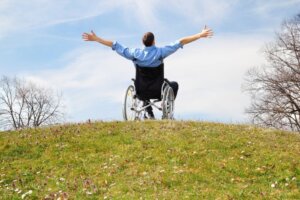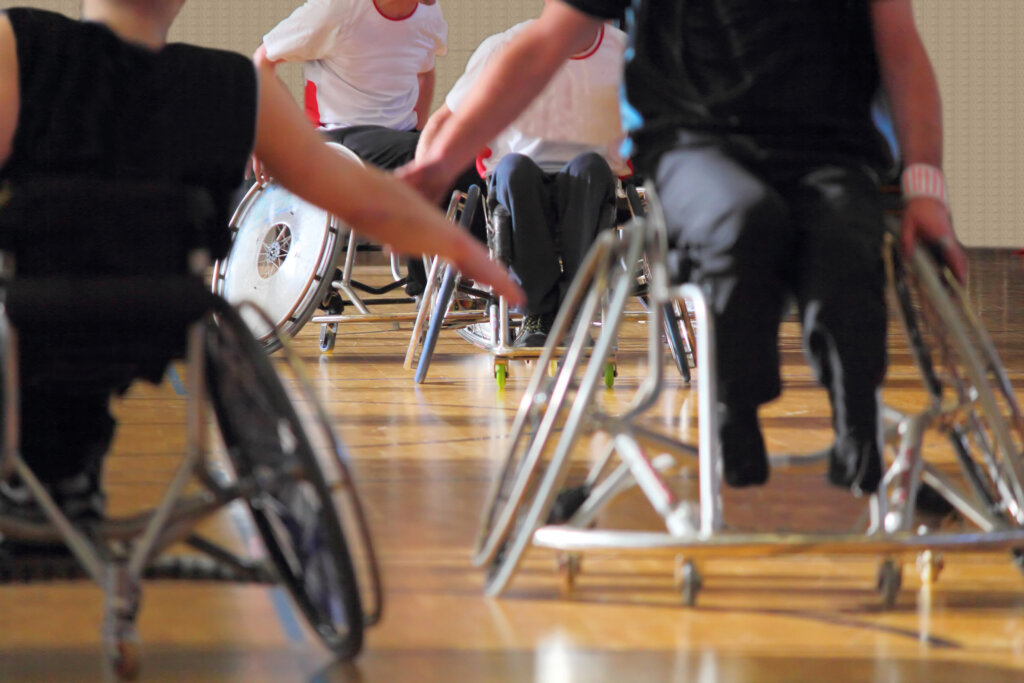How to Cope with an Acquired Physical Disability

Coping with an acquired physical disability is an extremely complex issue. However, it’s something that happens fairly frequently. Naturally, it’s usually a great personal challenge due to the tremendous emotional shock it generates in practically all areas of life.
In this article, we suggest some ideas for facing this new life. It will inevitably involve a significant amount of grieving, for your previous life, your new body and abilities, and any other associated losses. Finally, of course, it means facing your new reality.
How to cope with an acquired disability

Anna Gilabert is a psychologist at the Institut Guttmann. She suffers from a spinal cord injury due to a previous accident. This means she has to go everywhere in a wheelchair. She confirms that living with a neurological injury is no easy task. In fact, the psychologist affirms that this new reality implies facing certain difficulties in all spheres of life : biological, psychological and social.
“The degree of functional adaptation to this vital circumstance and the subjective experience of each one will depend on multiple factors: the characteristics of the injury, the sociocultural environment, personality, life cycle, family structure… and gender”.
-Anna Gilabert-
Each person will have their own particular resources to deal with their own disability. They might be personal resources or provided by the people around them. In this article, we give some ideas on facing a physical acquired disability.
Allow yourself to feel
Being faced with a physical disability means encountering a complicated situation, a clash with your previous existence. Therefore, there’s a break with your previous and present self that demands change and adaptation. In fact, you may feel a sense of shock when faced with your new daily routine. However, you must allow yourself to feel. Furthermore, remember that any and every emotion you experience will be perfectly valid and acceptable.
Try not to be held back in this regard. In addition, don’t feel guilty about your feelings. If they exist, it’s for a reason. Always remember that emotions are adaptive, even though they’re sometimes painful. Furthermore, they’ll develop if you allow them to.
“Let’s not forget that the little emotions are the great captains of our lives and we obey them without realizing.”
-Vincent van Gogh-
Let your emotions flow
Following on from the previous point, letting your emotions flow will allow you, in part, to give them space and channel them. At this stage, when you’re faced with your disability for the first time, it’s perfectly normal to feel emotions such as anger, sadness, helplessness, and frustration, etc.
All of these emotions form part of the painful feelings we’ll talk about in the next section. You might ask why it’s important to let your emotions flow. It’s because they’ll help you to adjust to your new reality. As the psychologist, Dafne Cataluña affirms, emotions have a series of functions. In fact, they:
- Evoke comfort when you’re sad.
- Distance you from the toxic.
- Help create energy when something blocks your goals.
- Allow you to seek security against threats.
Ultimately, emotions help you survive. Therefore, you must give them the importance they deserve. Above all, you must ask for psychological help if you feel that you can’t manage them or that they’re overwhelming you.
Manage your anger
Another idea that will help you in the task of facing disability is to manage your anger. It’s an emotion that appears very frequently in these types of situations. In fact, you may even end up taking your anger out on your loved ones.
Firstly, don’t blame yourself for your anger. Listen to yourself and understand why you’re acting like this.
Anger appears for many different reasons. It might be due to the frustration of not being able to change your new situation as you’d like. Or, it could be due to experiencing thoughts such as “why me?”Alternatively, you might be angry with yourself for what you’ve done or haven’t done. For example, maybe if you’d done something to avoid your accident you wouldn’t now be facing a disability.
To manage anger, you must understand its origin. You must also give it space and meaning. There are many ways to channel anger and other emotions. It might be through sharing your feelings, asking for help, practicing sports and other hobbies, seeking new challenges, writing, etc.
Talk to people in the same situation
Many people who’ve just acquired a physical disability say that what helped them the most was talking to people who’ve been through the same kind of experience. Talking to these kinds of people means talking to people who can understand you much more than someone who hasn’t had the same experience. Indeed, empathy is important here.
In addition, talking to others can help you realize the many things you can still do. Furthermore, you’re able to share your experiences, your doubts, and feelings, to relativize, and to feel you’re not alone. Ultimately, it’s about being able to observe how others have overcome their disabilities and how they’ve been able to be happy again in their new life.
Go ahead and try a new activity
Whether it’s a sport, a cooking course, starting some studies or any kind of new challenge…say yes. Activities can help you distance yourself from your new reality but in a healthy way. Because you’re investing your time and energy in new things that you can enjoy.
However, sometimes the objective isn’t so much enjoyment, but more the escape from the feelings of apathy you might find yourself experiencing.
Ask for help if you need it

It’s also important to surround yourself with loved ones and to look for spaces and people with whom to share how you feel. Furthermore, to ask for professional help when you feel you need it.
The rehabilitation hospitals attended by newly disabled people employ these kinds of professionals. This is because it’s essential that the emotional element of the whole process be managed. Indeed, it’s not just the physical rehabilitation that’s important.
A new reality: facing a disability
As we’ve seen, facing a disability implies a complex challenge. It involves dealing with a new reality. You don’t move in the same way, nor do you see yourself the same way when you look in the mirror. You also feel different, both when you’re alone and with others. However, at the end of the day, you’re the same person. It’s just that something’s changed.
It helps to know that this is a path, a gradual process of acceptance. It’s never going to be something that you accept overnight, but, little by little, you’ll start to feel better.
To face this situation, you must support yourself in your environment and work hard on your fears, doubts, and insecurities that arise along the way. Focus on your well-being and fight for the things that make you feel good again.
“Acquiring a disability involves a situation of crisis and change in many aspects of a person’s life. Every change involves a rethinking of one’s own values and the vision of oneself and the world. Working on self-concept is key to make the person look useful and improve their levels of self-esteem. “
-Testimony of a person with an acquired physical disability-
All cited sources were thoroughly reviewed by our team to ensure their quality, reliability, currency, and validity. The bibliography of this article was considered reliable and of academic or scientific accuracy.
- Aranis, P. (2003). Los estudiantes con discapacidad en una escuela para todos.
-
Bartón, L. (1998). Discapacidad y sociedad. Madrid. Narcea.
- Gilabert, A. (2016). Mujer y lesión neurológica. Neurorrehabilitación: 18-21. Recuperado de: https://siidon.guttmann.com/files/4gilabert.pdf
This text is provided for informational purposes only and does not replace consultation with a professional. If in doubt, consult your specialist.








